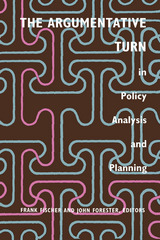
The contributors, scholars of international renown who range across the theoretical spectrum, emphasize the political nature of the policy planner's work and stress the role of persuasive arguments in practical decision making. Recognizing the rhetorical, communicative character of policy and planning deliberations, they show that policy arguments are necessarily selective, both shaping and being shaped by relations of power. These essays reveal the practices of policy analysts and planners in powerful new ways--as matters of practical argumentation in complex, highly political environments. They also make an important contribution to contemporary debates over postempiricism in the social and policy sciences.
Contributors. John S. Dryzek, William N. Dunn, Frank Fischer, John Forester, Maarten Hajer, Patsy Healey, Robert Hoppe, Bruce Jennings, Thomas J. Kaplan, Duncan MacRae, Jr., Martin Rein, Donald Schon, J. A. Throgmorton

Long-acting and reversible contraceptives, such as Norplant and Depo-Provera, have been praised as highly effective, moderately priced, and generally safe. Yet, as this book argues, the very qualities that make these contraceptives an important alternative for individual choice in family planning also make them a potential tool of coercive social policy. For example, policymakers have linked their use to welfare benefits, and judges, to probation agreements. In this book, authors from the fields of medicine, ethics, law, and the social sciences probe the unique and vexing ethical and policy issues raised by long-acting contraception.
The book offers comprehensive ethical guidelines for health care professionals and policymakers, as well as an ethical framework for analyzing policies and practices concerning long?acting contraceptives. The authors consider cultural, social, and ethical issues pertaining to contraception, and they provide historical and scientific background on today's controversies. They explore alternative conceptual and theoretical frameworks, including analyses of autonomy, coercion, and responsibility in reproductive decisions. This volume also notes the special concerns that arise when policies promoting long?term birth control target low-income women and women of color, and when these contraceptives are used in developing countries.

As our economic and natural systems continue on their collision course, Bruce Jennings asks whether we have the political capacity to avoid large-scale environmental disaster. Can liberal democracy, he wonders, respond in time to ecological challenges that require dramatic changes in the way we approach the natural world? Must a more effective governance be less democratic and more autocratic? Or can a new form of grassroots ecological democracy save us from ourselves and the false promises of material consumption run amok?
Ecological Governance is an ethicist’s reckoning with how our political culture, broadly construed, must change in response to climate change. Jennings argues that during the Anthropocene era a social contract of consumption has been forged. Under it people have given political and economic control to elites in exchange for the promise of economic growth. In a new political economy of the future, the terms of the consumptive contract cannot be met without severe ecological damage. We will need a new guiding vision and collective aim, a new social contract of ecological trusteeship and responsibility.

All manner of medical practitioners have had their scruples dissected ad infinitum. In spite of the attention paid to medical ethics and bioethics, little has been paid to the ethical roles and responsibilities of those who are ultimately in charge of hospital governance: hospital trustees.
Deriving from a Hastings Center research project involving meetings with a national task force of experts and extensive interviews with 98 nonprofit hospital trustees and CEOs over a two-year period, The Ethics of Hospital Trustees shows that the decisions made by these often overlooked members of the health community do raise important ethical issues, and that ethical dimensions of trustee service should be more explicitly recognized and discussed.
Practical as well as theoretical, The Ethics of Hospital Trustees uncovers four basic principles: 1. Fidelity to mission; 2. Service to patients; 3. Service to the community; and 4. Institutional stewardship. In delineating the extremely important functions of hospital trustees, from patient safety to financial responsibility, the contributors outline not only how hospital trustees do perform—they give a fresh understanding to how they should perform as well.

Modern psychological and political theory meet head-on in this powerful re-evaluation of America's contradictory and sometimes dangerous addiction to individualism. Best-selling author Gaylin and co-author Jennings investigate the contentious intersections of interdependence and autonomy, rights and public responsibility. They examine the painful abrasion occurring between America's tradition of personal freedom and privacy, as it rubs against the still valuable if almost vanishing ideals of sacrifice and social order.
Our current culture of autonomy—championed by both liberals on the left and libertarians on the right—is based on the idea of rationality as the motivation for human conduct. But, as the authors remind us, people are not simply rational creatures—appeals to emotions are always far more effective than logical argument in changing our behavior.
This timely edition includes a new preface; updated examples and illustrations throughout; and new coverage of contemporary social critics and their work since the publication of the first edition. Two essential new chapters, one on the movement to forgo life-sustaining treatment and the other on physician-assisted suicide, particularly clarify the authors' arguments. Drawing on these and numerous other illustrations—with significant emphasis on the state of American health care—Gaylin and Jennings demonstrate that society has not just the right but the duty to occasionally invoke fear, shame, and guilt in order to motivate humane behavior.
As cases of AIDS are once again on the upswing, as the dangerously mentally ill are allowed to wander free and untreated, as starvation and poverty still hold too many in its grip in the richest nation on the planet, this controversial book, considerably revised and expanded, is needed more than ever. If we are to indeed preserve and nurture a genuinely free—and liberal—society, the authors suggest that these "coercions" may be essential for the health and the maturity of a nation where we all too often avert our eyes, not seeing that our neighbor is in pain or trouble and needs our help.

As prenatal tests proliferate, the medical and broader communities perceive that such testing is a logical extension of good prenatal care—it helps parents have healthy babies. But prenatal tests have been criticized by the disability rights community, which contends that advances in science should be directed at improving their lives, not preventing them. Used primarily to decide to abort a fetus that would have been born with mental or physical impairments, prenatal tests arguably reinforce discrimination against and misconceptions about people with disabilities.
In these essays, people on both sides of the issue engage in an honest and occasionally painful debate about prenatal testing and selective abortion. The contributors include both people who live with and people who theorize about disabilities, scholars from the social sciences and humanities, medical geneticists, genetic counselors, physicians, and lawyers. Although the essayists don't arrive at a consensus over the disability community's objections to prenatal testing and its consequences, they do offer recommendations for ameliorating some of the problems associated with the practice.
READERS
Browse our collection.
PUBLISHERS
See BiblioVault's publisher services.
STUDENT SERVICES
Files for college accessibility offices.
UChicago Accessibility Resources
home | accessibility | search | about | contact us
BiblioVault ® 2001 - 2024
The University of Chicago Press









